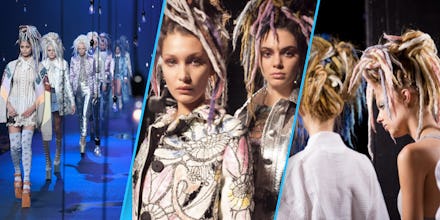When Marc Jacobs models wear dreadlocks it's "high fashion" — not so for everyday POC

On the final day of New York Fashion Week, designer Marc Jacobs sent a parade of nearly two dozen models down the runway wearing multicolored faux dreadlocks. Only a handful of whom were black.
Jacobs' cast of course included Kendall Jenner, whose sisters Kim, Khloe and Kylie have all, at some point, been indicted for sporting historically black hairstyles like cornrows or dreadlocks. But while many people have found it easy to nail the Kardashian-Jenner clan for cultural appropriation for their everyday looks, outlets like Elle and W magazine have been hesitant to sound the alarm for designer Marc Jacobs — mostly because, well, it's "high fashion."
W referred to the rainbow dreadlocks — which the magazine reported hair stylist Guido Palau bought from an Etsy shop after simply googling "dreads" — as "raver hair." Elle also noted Jacobs' runway resembled a "rave" and said the dreadlocks seemed to be part of a look more reminiscent of "Burning Man than New York Fashion Week."
All in all, Jacobs' homage to "rave" culture was a success. But the average person of color looking to rock the same 'do as Jacobs' models usually isn't met with the same applause.
In August, a black woman named Rachel Sakabo claimed her dreadlocks cost her a desk job at Manhattan's St. Regis hotel. Shortly after a manager approached Sabako telling her "braids" (which Sabako pointed out were not braids, but dreadlocks) weren't allowed at the front desk, Sabako was fired because she wasn't a "good fit" for the job.
"It's rude and disrespectful, and so damaging," she told Mic at the time. "As a woman, it feeds into the insecurity of not being enough because your look is unacceptable; like being 'politely' told you're ugly."
Even actress Zendaya Coleman wasn't exempt from criticism when she wore dreadlocks on the red carpet at last year's Oscars. Giuliana Rancic of E's Fashion Police speculated the hairstyle meant Zendaya likely smelled of "patchouli" and "weed." (Rancic had also allegedly once called Kylie Jenner's dreads "edgy.")
Shelby Swain, the stylist behind Zendaya's locs, said her main concern regarding Jacobs' show is about giving credit. "I work with a lot of white models and I give them the chance to try a lot of crazy hairstyles," Swain said in an interview on Friday. "But at the end of the day I give credit where credit is due."
When the Cut asked Palau about the inspiration behind the Marc Jacobs dreadlocks, "he cited the '80s, raver culture, Boy George, and Harajuku as references." He also told the site that Rasta culture hadn't been an inspiration whatsoever.
"I take inspiration from every culture," Palau said to the Cut. "Style comes from clashing things ... If you're creative, if you make food, music and fashion, whatever, you're inspired by everything. It's not homogeneous. Different cultures mix all the time."
Swain pointed out it would have been easy for Palau to credit someone like singer George Clinton, known for his colorful dreadlocks. And, at the end of the day, she'd be more willing to call Jacobs' look "appreciation" if he had a stylist who was a woman of color woking with him.
"If Jacobs hired people like me on his team we could talk, work together and make the work more acceptable to the world," said Swain.
Jacobs himself took to Instagram to make his defense, reportedly writing in a comment:
And all who cry "cultural appropriation" or whatever nonsense about any race of skin color wearing their hair in a particular style or manner - funny how you don't criticize women of color for straightening their hair. I respect and am inspired by people and how they look. I don't see color or race — I see people. I'm sorry to read that so many people are so narrow minded... Love is the answer. Appreciation of all and inspiration from anywhere is a beautiful thing. Think about it.
Women of color have, of course, been "thinking about it" for a long time — and the answer to the "appreciation vs. appropriation" question isn't so complicated.
"Marc Jacobs is a huge designer known all over the world," said Swain. "He could've avoided the backlash by doing the right thing and giving credit."
Mic reached out to Palau for comment.